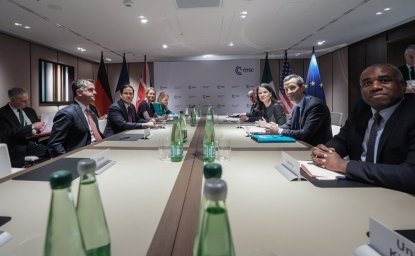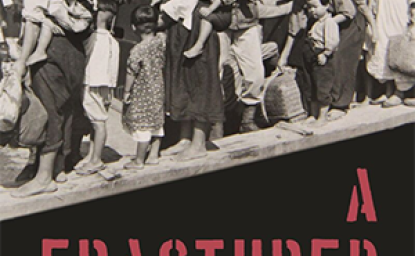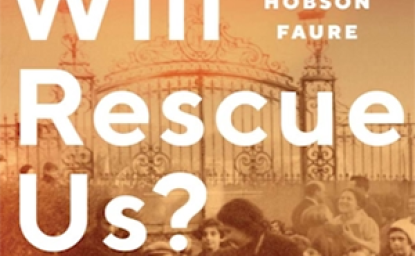This is an unedited transcript
Hello, I'm John Milewski, and this is Wilson Center, now a production of the Woodrow Wilson International Center for Scholars. Well, our tradition is that every time a new issue of the Wilson Quarterly drops, we do a program about it.
And so we're joined today by the editor of the award winning Wilson Quarterly, Stephanie Bowen, and one of the contributors, Izabella Tabarovsky. Isabella is senior advisor at the Kennan Institute, where she oversees regional partnerships and programing, independent journalism initiatives and the historical memory Initiative. And for our purposes today, she's the author of one of the pieces in the new issue titled Anti Semitic Propaganda and Disinformation in Putin's War against Democracies.
And we'll do a deep dive into Isabella's work in a moment. But first, Stephanie, as we like to do, we want to begin with an overview from you. Tell us about the issues. Quite a challenge. Understanding Russia is a heavy lift. Well, not only understanding Russia, but paying tribute to the Kennan Institute's 50th anniversary. That's really how this came about.
We wanted to do something special for that 50th year and we thought, what a wonderful way to do it by having a special issue of the Wilson Quarterly that leverages the expertise within the Institute from past and present staff and scholars to both reflect on the amazing history and look at the incredible moment we are in right now when it comes to U.S. Russia relations and Russia's place in the world.
It's just incredible timing. Yeah, And, you know, I should tell our viewers, in addition to what we're talking about today on the Quarterly, we'll also be doing more about the 50th anniversary of Canada in a future program. And, you know, I'm thinking back to when I first started at the Wilson Center, Kennan was this historic program, the first program at the Wilson Center.
So it's oldest program, but also was a little bit sleepy at the time, Right, because there wasn't much happening in Russia. Boy, how the world has changed in that time. So, Stephanie, about the issue, tell us about some of the contributors beyond what Isabella wrote and then we'll dive into her piece. Yeah, there's really some amazing pieces and contributors.
We we got four past directors of the Kennan Institute to contribute They look back on their tenures. The current director of the Kennan Institute, Will Pomeranz. He really frames the issue quite well. We have the last U.S. ambassador to Russia before all the craziness broke out, John Sullivan, and he gives some wonderful insights to, I think, current diplomats, but also just really a nice tribute to the Kennan Institute and George Kennan.
The you know, it's going to say the namesake, but who is one of the co-founders? Yes. And we have several journalists like Isabella, who have Lucian Kim. He really draws on his time spent in Crimea a decade ago to help us understand what went wrong and why we are where we are now. Max Trudel above really provides great insight into what is going on in terms of, gosh, Russia's descent, Russia's attack on dissent and how that has been felt through the years and why we're at a critical moment now.
The former ambassador of Venezuela, ambassador to the US, gives some broader perspective on that and what the disinformation and propaganda war throughout Latin America, what's happening with that? We also have we talked to the Clint Williamson, who is involved who is overseeing the investigation into to war crimes in Ukraine, to to find out what's going on there now with the latest update is and how things will be moving forward in order to try and hold Russia and Putin accountable for some of these war crimes, which is there's a lot in this issue.
And and I will say one of the thing that things that comes up a lot is George Kennan. We Michael Kimmage does a fantastic look at how relevant George KENNAN'S long telegram still is today. And and then we also look at scholars and the role of scholars, which is so key to the Kennan Institute and and to the Wilson Center.
But how that's become a little bit more difficult under the current regime and in the current environment. So there's just a lot to look at. and then the energy crisis that the war has has exacerbated it. We have a great Q&A on that with a former Kennan Institute fellow and the director of the Environmental Change and Security Program at Wilson Center, too, to look at that a little bit more closely.
And then, of course, there's a wonderful foreword by Ambassador Green that I think as the president and CEO of the Wilson Center, he has a unique perspective on how the Kennan Institute fits into everything and why it is more important today than it ever was. And that's that's one of the things that I walked away from. Yeah. Walked away with.
Yeah, Yeah. The whole you know, there are clichés like the now more than ever or more relevant than ever. And at moments like this, we're reminded why they are part of our lexicon, because they happen to be immensely true at a moment like this. And it is it now more than ever scenario. And Isabella, I want to speaking of someone who's in the eye of the storm.
Right, sitting in Israel, studying Russia, looking at the history, talking, writing about anti-Semitism, I mean, it couldn't be more relevant than it's ripped from today's headlines. And I've always I want to say this and Stephanie, I'm sure you'll agree. I think your article, Isabella, is like exhibit A in just what a valuable resource the Wilson Quarterly is, because in a relatively brief piece it's amazing the scope that you cover and the dots that you connect through history and through issues and across the globe.
It's really a spectacular value for anybody who's going to take the time to read it. So congratulations to both of you on the issue and on this particular article. And Isabella, let me ask you about it. The you begin the article by talking about this myth of Israel. Somehow being in cahoots with ISIS. And the statement in there is those who follow the ebbs, flows and transformations of global anti Semitism know that this variation on classic anti-Semitic, anti-Semitic conspiracy theory fits seamlessly with other paranoid fantasies about Jewish power and perfidy.
And one thing I'm struck by as I read those words is that, unfortunately, this isn't limited to Russia. Well, that's exactly right. And we are, of course, seeing the resurgence of anti-Semitism right now. Unfortunately, in the U.S. We're seeing it all over the world. And so much of it, a lot of times it's couched in different terms. And in my piece, I talk about how you have people on the far right talking about Jewish power and you have people on the far left doing the same, but they couch it in different terms.
But the foundations are the same. The foundations go back the tropes, the kind of the myths of the protocols of the Elders of Zion, which happened to actually have come out of Russia. It's kind of the ultimate book of conspiracy theory, probably one of the most bestselling books around the world throughout the past century or more since it was first produced.
And it keeps kind of evolving and being used by different groups to speak of this myth of Jewish power the idea that Jews, Jews manipulate the world behind the scenes. That is that history in a nutshell. The reason why anti-Semitism is ingrained in Russian public discourse and in its international messaging. Well, I think there are multiple factors here.
Certainly, it's very much ingrained in Russian public discourse in general, but it is also something that can be manipulated and used for political purposes and weaponized for political purposes. So you can artificially inflated. It doesn't have to be there. It's not you know, it's not definition. It kind of by definition, it doesn't have to be there, you know, a priori.
And you can create policies where you would discourage this kind of discourse. But right now inside Russia, the conditions are such that, in fact, the authorities hope to invade and the signals start from the top. Lavrov, the foreign minister, they all allow themselves the kind of, you know, phrases or terms of turns of phrase and sort of little stories, little jokes, little anecdotes that immediately communicate to people.
And, you know, as we say in anti-Semitism studies, they dog whistle, you know, they're dog whistles to specific audiences that will hear these little anecdotes and they will understand them and they will know immediately what's meant. And it breaks certain taboos and it communicates that, okay, this leaders on the same page as me and and it instills a certain kind of, you know, perspective of conspiracy theory that, you know, there is somebody manipulating.
I'm not in power here. There are some dark forces manipulating the politics in our country. And no wonder everything is looking so terrible. You know, you talk about it in the article, but for those who haven't read it yet, explain this contradiction in logic. You know, you talk about the dog whistles. We've heard certainly a lot of those in slanders toward Zelensky's Jewish heritage.
And yet Russia's main stated motivation for launching the attack is de-Nazification of Ukraine. And if you're looking at this logically, those things can't live in the same space. Right? Well, it's interesting. What's interesting about this is that anti-Semitism conceptually permeates the use of these contradictory ideas. So depending on who you are, like we have historically, there were groups that said that Jews were behind the Bolshevik Revolution, and at the same time, there were groups inside the USSR who associated Jews with capitalism.
So Bolsheviks and capitalism, they are the opposite ends. And yet Jews are both. As other periods, Jews were called radical nationalists. And at the same time, this is in Stalin's time they were called cosmopolitans, rootless cosmopolitans. So here you have another seeming contradiction, which again in the antisemitic imagination is not really contradiction. And we hear Lavrov said, Well, okay, Zelensky is Jewish, but it doesn't mean that he can't also be a Nazi.
And then he uses a and anti-Semitic Ms. that claims that Hitler was actually Jewish. So so it's not it's not for it. Again, in the kind of and the world of anti-Semitic conspiracy theory, it all can work anyway whereas for for in the normal world it seems like a contradiction. You know, in the altered consciousness of anti-Semitic conspiracy theory.
It all works together. Yeah. Conspiracy theories aren't about rationality, right? And these conspiracy theories almost rise to the level of myth. They're the power of myth. They because they're so ancient and because they're so persistent. So I don't want to hog all the questioning. I have so many more for you, but I want to turn it over to Stephanie so she can ask you a few questions as well.
Thank you. Yeah, you know, I was I'd like for you to talk a little bit about how Russia has worked with others to foment anti-Semitism and release the spread, spread that around other countries. And and how that has, you know, been part of his arsenal, if you will. Well, yeah, that's a really good question. First of all, there is a very long history to it.
You know, Russia used to do this during the Cold War, and that's when it actually was probably one of the biggest scholars of anti-Semitism would say that during the Cold War, Russia was the biggest purveyor of anti-Semitic propaganda internationally. Today, what happens is that after October seven, Putin saw an opportunity for himself. Before that, there was sort of for a few years that Russia had a good relationship with Israel.
And then after October 7th, an opportunity opened for Putin to reengage with actors that are known for their anti-Semitism, such as Hamas. Right. Such as Iran. And and and it he jumped on this opportunity. And so we see Hamas traveling to Moscow and we see Putin really kind of bonding more and more with Iran. And this is connected to the fact that Russia felt increasingly isolated on the global scene.
And this is an opportunity now to create kind of an axis of anti-Western axis. And here, Putin most certainly stands with organization, with groups and entities that place elimination of Israel. So elimination of half of the world's Jewish people on their agenda. So Putin stands with them. Putin actually never condemned the what happened on October 7th, Hamas's attack.
So. So this is again, it's the use of, you know, antisemitism. Antisemitism is often viewed exclusively as prejudice, but it is more than that. It's. And that's what my piece is about, is that it's used as propaganda. It's used to stir trouble in Western societies. I think Deborah Lipstadt talks about it. It's a school of anti-Semitism and the UN, the State Department's envoy for Against Antisemitism, that this is something that authoritarian regimes use to stir trouble among them in democratic societies.
I have another question, if that's okay, John. So, you know, it really struck me when I was reading background material and a lot of the things that you have done, Isabella, are quite scholarly and there's a lot of scholarly work about this topic. But, you know, what would you say to people that aren't reading the oodles and, you know, like pounds of material that there is out there?
What is it that we really should know? And how pervasive is this? Because it's showing up more in social media feeds and on the news right now because of what is going on in the Middle East and across U.S. campuses and other things. But a lot of times it's it's in the background and it's been in the background for a long time.
So how do you bridge the divide between in, you know, what's happening and what people see? Look, it's it's a very difficult moment right now, actually. And I think it's a it's a very complex issue and a complicated issue. And unfortunately, from my my observation is that in general, mainstream media in there is not very well equipped to cover it.
And I don't see journalists turning to scholars on this very eagerly. They think that it seems like anti-Semitism is something that people intuitively should understand, but they don't. And a lot of times what people don't understand is that I think a lot of times people believe that anti-Semitism primarily comes in, you know, in the Nazi or neo-Nazi shape.
So that kind of anti-Semitism, people get the purely kind of racist hate. But again, anti-Semitism shows up in so many ways. And for example, anti-Semitism that comes out of the hard left, out of the radical left looks very different. And this is where it becomes confusing because people start to think, well, anti-Zionism, anti-Semitism, there is a lot of doozies.
Some people attempted to say, well, there there's definitely they're very different. But there are also there are a lot of ways in which they intersect. They intersect in that kind of in the demonization of Jews and everything associated with Jews, including the Jewish state, including Israel, include in the ideology of Zionism. And it's really important here to speak to to scholars, to people who studied and understand it, because sometimes the word Zionist is used as a code word for Jew, and we really need to learn it and to understand it in order to understand the current events.
I want to dig a little deeper on this topic that Stephanie just raised with her question. And, you know, this notion of not fully understanding things, I mean, we live in a particularly United States. We're almost an ahistorical culture. You know, the history for us is five years ago. And so things that that you touch in the article like the Operation Panda and Russia's export of anti-Semitism dating back to the seventies, the 1975 U.N. resolution equating Zionism with racism is another example.
And then you even quote David Duke, a former presidential candidate here in the United States, and make the point that, you know, for American and European neo-Nazis and white supremacists, they've long admired Russia as this last bastion of white supremacy. So if you could provide us with some of that historical context that is really lost in the contemporary discussions where, you know the most we do in the press often is make sort of broad statements like another Hitler, you know, these allusions to history, but we don't really dig deep into it.
Right. Well, I'm always amazed, you know, when I tell people that a lot of the rhetoric we're hearing today actually originates in Cold War propaganda. And people say, well, that was so long ago. And I think to myself, well, that was not that long ago. I mean, I remember it. So it's not it's not that ancient. You know, It's not it's like 50 years of the 30 or 40 years ago.
It's not that long ago. So some of these things, you know, some of the ideas that became prevalent in the seventies and you see them like I spend a lot of time reading, for example, communist press, you know, British, American. And you see a lot of the things that were said. They're corresponding exactly with what we're seeing today.
The idea that Israel is an apartheid state or that Zionism is fascism and Nazis. We know I know that it comes out of Soviet propaganda because I have studied it. And there is absolutely it's absolutely clear to me that there is a line of transmission. You know, I think when people often fail to understand it, But if I tell somebody, well, the neo-Nazis today use the language that was invented by Hitler, right.
That was invented in Nazi Germany, that seems like a completely natural idea. People understand it. It makes sense to them. And that's why it's precisely why the neo-Nazi language is so dangerous. But if you say that some of the language in the radical left times from, you know, from the Soviet Union, from the communist propaganda, people seem to really people have a hard time understanding it.
And yet that transition is there. And by the way, the Soviet Union ended only 30 years ago. Nazi Germany ended almost 80 years ago. So there's there's nothing strange about there being kind of lines of descent. But tag team over to my partner here. Stephanie, back to you. That, you know, one of the things that, you know, I recognize that we're at a pretty important moment right now when it comes to anti-Semitism, given the, you know, Hamas, Israeli conflict and and what has sprouted from that?
I mean, what what should we be doing? What should Western leaders and policymakers and the media be doing to try to get some sort of control over the spread of anti-Semitism and propaganda? Well, look, if I had the answer to this question, you know, we would have had it solved a long time ago. Look, I think that there are many things that can that should be done.
I think that one of the really important components here is education. Again, a lot of people simply don't understand certain aspects of anti-Semitism. So I call on journalists who may be watching us to speak to scholars who actually have studied not only Nazi anti-Semitism, but also kind of left wing anti-Semitism. It looks different. It presents itself differently. I think that the IHRA definition of anti-Semitism is very, very important.
It's the most widely adopted definition. It's adopted by State Department already by by the Department of Education. It's in it now. It very much helps organizations to deal with these issues. And as I say in the article, I think that overall we need to change. We need to change some things in the way we approach our education. I think that we have gotten accustomed to having the United States viewed as the guilty party and everything.
I think it would be good for us to talk a little bit about what great things the United States has done specifically. You know, as a former Soviet citizen, I can say that I think America has always been a beacon of hope to all of us. It's won the cause of freedom during the Cold War. I'm not embarrassed to say that.
I think more of us need to be saying that and more of us need to be proud of what America stands for. You know, Stephanie, you went to the billion dollar question about what can be done, right? I mean, it's I have to say, when I when I do interviews like this and we talk about some of these really complex, ingrained problems, I feel a little guilty when I ask our guests, what can we do?
But it has to be ask. And one of the things that is really eye opening in the article is and I can't remember who it is you quote, but one of the people you talk to who makes the point that we haven't thought about our educational system as a strategic asset, I never really saw it in those terms.
And that's just the point you were making now. Can you expand on that a little bit and and what that means? Yes. Well, this is exactly this this my interviewee was talking about. You did Barsky was talking about it in the context of the investments that or the the the financing from Qatar that has become part of national news quite a bit in the last several months.
You know, there are reports there's a report that I quote in the piece that talks about the the unreported money that has flowed from authoritarian regimes, in particular Middle Eastern regimes and in particular Qatar to American campuses. And the report finds that there is a there is a statistical it's not a causation, but but you have a correlation between the amount of money that a campus get of that kind of money that the campus get got.
And anti-Semitism on that campus. And then the report also shows that this kind of the the the incidence of anti-Semitism on campuses also forward predicts overall incidence of antisemitism in society. So this is really I think this is what he was talking about, that we have allowed this kind of money to flow into our education system because we haven't thought about about our education as something that's really our strategic asset.
And when we don't see it, while we don't see it, others see it and they put the money in because they hope to get something out of it. And that's definitely something we need to be thinking very, very carefully about. You know, you alluded to it, but before we we end, I do want to also get back to this notion that Russia is not in this alone and their campaign to destabilize Western democracies is it's not a solo act.
Right. And Iran and now China is a new player coming to the table. And there's I think I'm trying to find my notes on this. But you write something in the piece about an uptick in anti-Semitism in Chinese social media. Can you talk about this as a more of a global phenomenon beyond Russia? Well, I think with regards to two China, which I'm certainly no expert on, but there are reports of China suddenly that this is new.
What China, China, utilizing these tropes on social media also as a weapon to against Western society. So I think that this is I mean look, I think and nobody would deny that we are now the West and certainly the United States democracies are now in the in a chaos. Right. We are in a in a at a time of instability.
We have riots and protests. And when authoritarian regimes see like that, I mean, look, Deborah Lipstadt always says that. And, you know, I would agree with that 100% that austerity, authoritarian regimes can really create these kinds of deep seated problems. The problems have to be there for them to come in and and kind of widen the cracks and create more chaos, intensify the conflicts.
So this is you know, it's a signal for us to do to kind of look at what's what's happening, how can we heal this problems and how can we solve them, Because if we don't, that makes us vulnerable to all these different actors who are who are now together looking to to use this moment of weakness against Lipstadt quote that you bring up.
I want to want to show our viewers, see a little star next to my notes. I had that in there. It haunts me. What I read that you authoritarians can't create this. They can only add fuel to a fire that's already burning. That really puts it in a context that is very daunting. Before we close, I want to give both of you an opportunity, Stephanie, to have any more questions you want to ask before we wrap up, just a final thought and then I'll give Isabella the final word.
Well, my my final thought is that Isabella is an example of the type of expertise that the Kennan Institute has. And it was really such an honor to put this issue together, really drawing from from that expertise. And and I hope people enjoy the issue and come away with just a small sense of what the Kennan Institute has to offer and has offered for the past 50 years.
Yeah, very generous of you. And I'll also add and what the Wilson Quarterly has to offer, the combination is, is dynamite. I mean, there's so much to be learned. Just the article we talked about today is one and it's so rich and so deep. Isabella, final thoughts. When I say that, I think it's important to understand that when we see the explosion of anti-Semitism, that that it's not only against Jews, it's not only Jews who are in danger when this kind of rhetoric and conspiracy mongering takes hold in a society, it creates opportunities.
It opens the door for creating the same kind of hostile environment against other minorities. And once again, I want to underscore that it undermines our democracy. And that's you know, this is where anti-Semitism becomes a threat to national stability. This is devilish religious main point. And I want to come to finish on it, because I think it's so, so crucial.
It really becomes a national issue that we all need to be looking at and trying to solve. Thank you, Isabella. Stephanie, I that was our final word on contents. But I do want to do a plug. You know, when I promote the WQ, I feel like I'm a salesman. But the reality is we're giving it away. We're not selling anything.
And I truly believe in the value of the publication. Can you tell those who may not be familiar how they can read the WQ and even subscribe? Yes, you can subscribe at Wilson Quarterly dot com. Our issues come out four times a year and we do send out the occasional email, but we do not spam our subscribers. And yeah, it's a complimentary service of the Wilson Center and I hope that you enjoy it and you'll learn a lot from it.
Izabella Tabarovsky, Stephanie Bowen, thank you very much for all your work, your ongoing work, but also for joining us today. Thank you. We hope you enjoyed this edition of Wilson Center. Now that you'll join us again and you'll also read the Wilson Quarterly. Until then, for all of us at the center. I'm John Milewski. Thanks for your time and interest.











